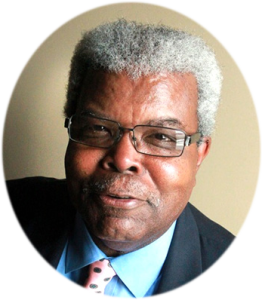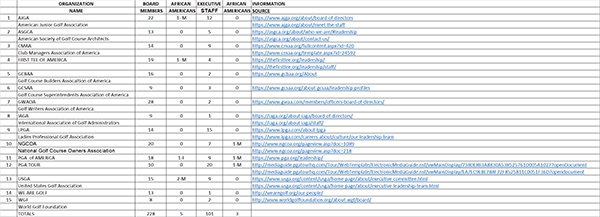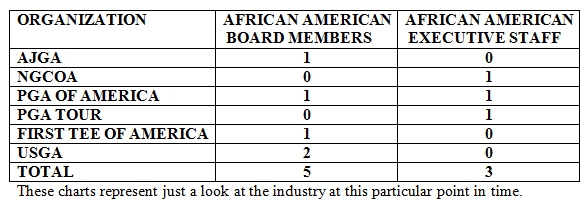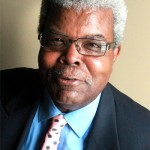(November 15, 2019) — I have struggled in my preparation for writing this article. I have prayed for proper guidance. I have had sleepless nights as I contemplated, researched and reflected for this writing. Why? Well, I need to state that I love the game and the industry and I don’t want to unfairly attack something I love dearly, but on the other hand, I am not satisfied with the measurable accomplishments of the industry when it comes to Diversity and Inclusion especially as it relates to African Americans.
So, my dilemma was how to best approach and broach the subject without being negative or injurious to the very thing I love and respect. So, on one of my sleepless nights, it occurred to me that I should approach this subject in the same manner as I would if was evaluating a golfer.
In other words, because I would want to see the golfer improve, I would have to point out, evaluate and recommend appropriate changes to his or her game. I would critically evaluate their setup, putting, short game, approach shots, and drives. Why, because I want the golfer to improve and they can only do that by knowing and addressing their weaknesses and working tirelessly on those areas. I would not sugar coat their game, I would analyze it piece by piece as any good coach would do and layout a game plan to address each area.
Well, the $84 Billion industry and game of golf is my player and I am going to evaluate it with empirical honesty and make empathetic recommendations for improvement.
BACKGROUND
The diversity initiative was created within the World Golf Foundation in 2008. This led to a year-long study on the state of diversity in the U.S. golf industry in 2009, followed by a 2010 diversity forum bringing industry and diversity leaders together. Four diversity focus areas were determined: Recreational Play, Competitive Play, SupplierDiversity, and Workforce. This evolved into the formation of the Diversity Task Force in 2011, with a vision statement of the following: “To make golf look like America”
Well, what does America look like?
According to the latest government information, America has a total population of325,719,178
Of that total, the White population is 72.4%of the total and the African American population is 12.7 %of the population.
https://data.census.gov/cedsci/profile?q=United%20States&g=0100000US
With all due respect to other ethnic groups, this article only addresses the state of African Americans in golf.
So, how do African Americans stack up in golf not only in the targeted areas but a special category of Senior Management and Policy-Making?
According to the National Golf Foundation in the area of
Recreational Play:
- There are 24 million participants
- 3% are African American
According to data developed by the Diversity Task Force in the area of
Competitive Play:
- From a sample size of slightly more than 30,000 competitive golfers
- 1.5% are African American
According to TEconomy Partners and the Diversity Task Force in the area of
Workforce:
- Golf has an $84 billion economic impact representing two million jobs
- From a sample size of slightly more than 30,000 golf industry workers
- 3% are African American
According to the Diversity Task Force in the area of
Supplier Diversity:
- From a sample size of nine major golf industry associations
- 22% have a supplier diversity policy in place
According to the National Golf Foundation and the African American Golfer’s Digest,
In the area of Golf Course Ownership
- Of the 16,693 golf courses at 14,613 golf facilities in the U.S. in 2018
- African Americans have at least 50%ownership in 6 courses (Including one by ‘his Airness,’ Michael Jordan)
According to the Diversity Task Force, in the area of
Professional Membership Organizations:
- From a sample size of 50,000 professional members
- Approximately 1% are African American
and last but not least is perhaps the most important area of all
Senior Management and Policy-Making Positions
- African Americans account for less than 2.5% of golf industry Boards of Directors and Executive or Senior staff leadership positions
- Source: Independent Research by AAGD Executive Editor
I say this is the most important because the decisions that chart the course of the golf industry are made by Boards of Directors and Senior Management of key organizations and associations. So it stands to reason if African Americans are not represented in these positions that very little if any input that guides the industry especially in policy-making and major operational decisions will be made to positively affect African Americans.
Mind you that several organizations have policies, statements, and programs in place as it relates to Diversity and Inclusion. Here are a few:
THE PGA of AMERICA
PGA Professionals bring energy to the game all around the world through engagement at their clubs and in their communities, inspiring individuals of all ages and diverse backgrounds to learn and play the game of golf.
Making the entire industry’s workforce more diverse is crucial to our ability to grow participation in the sport and attract new talent to the business. We are committed to recruiting, developing, engaging and retaining diverse talent at all levels, in all disciplines, and in all locations across the Association.
PGA Lead is our leadership development program designed to identify, mentor and progress PGA Professionals from diverse backgrounds into volunteer leadership roles at the Chapter, Section and National levels of the Association.
To read more about the PGA efforts go to https://pgaimpact.org/workforce-diversification/
The AJGA The American Junior Golf Association (AJGA) is committed to creating an engaging, safe, and inclusive environment. We welcome people from all backgrounds and believe by embracing diverse perspectives, we are better equipped to accomplish our mission of developing golf’s next generation.
The LPGA
Visible Commitment to global diversity, inclusion, individuality, and authenticity
The USGA
We listen to and leverage diverse perspectives from the golf community; we collaborate and encourage healthy debate
The PGA TOUR
As a global organization, the PGA TOUR aspires to reflect the regions and communities where we play as we believe diversity of thought and background is vital to our success and growth. We strive to create an inclusive and welcoming culture and be a positive example for all of our constituents and partners.
Our diversity shines through our backgrounds and perspectives, and we showcase golf as a game for all.
While these are good and laudable statements and honest efforts, it is not enough as meaningful and systemic change must come from the top. The top means until the respective Board of Directors and Executive Management of golf’s major organizations and associations include African Americans, very little will be done to significantly change the narrative, it just will not happen.
In fact, African Americans might perceive your organization to be racist despite your best Diversity and Inclusion efforts if:
- You have no African Americans on your Board of Directors
- You have never suggested an African American join your board
- You have no African Americans in Senior Management Positions
- You have never interviewed an African American for a Senior Management Position
- You have no written or published plan dedicated to Diversity and Inclusion
- You have no written or published a plan to measure your Diversity and Inclusion progress
- You have no written or published Supplier Diversity program in place
Get the picture? Thank you, Jeff Foxworthy!
So, from my perspective, even though the “Caucasian Only” policy was removed in 1961 from the PGA of America by-laws to allow African Americans membership and to compete, it would appear as though vestiges of that by-law have remained in force, as it relates to the number of African Americans managing or setting golf policy at the highest levels.
Let’s take a look at several leading golf organizations that makes my point.
I reviewed 15 leading golf organizations and associations. The methodology was simple.
I reviewed their websites and located their leadership information on their respective websites. I then proceeded to examine their board of directors and executive staff information as stated or depicted on their respective websites. AAGD also contacted each organization to confirm or update our findings and invited each to make any statement they deemed appropriate.
AAGD always seeks to be accurate, fair and balanced. I must admit that I was pleasantly surprised by the number of organizations responding and the depth of their honesty and concerns in addressing this topic.
Due to the tremendous response from several of the organizations, AAGD plans to publish a series of articles profiling various golf organizations’ Diversity and Inclusion efforts.
BOARD OF DIRECTORS REPRESENTATION
Of the 15 organizations representing 228 board positions, my findings revealed that just 4 African American males and only one African American female serve on these boards.
The African American males are on the boards of the USGA 2, IAGA 1 and THE FIRST TEE 1. One African American female is on the board of the PGA of AMERICA.
- African American males represent 4 of 228 positions which is 1.75 %
- African American females represent 1 of 228 positions which is .43 %
- The total African American percentage is 5 of 228 positions which is 2.19%
EXECUTIVE STAFF REPRESENTATION
Of the 15 organizations representing 101 executive staff positions identified, my findings revealed that 3 African American males and 0 African American females serve in executive positions.
- There are NO African American females serving in executive positions
- The African American representation is 3 of 101 positions which is 2.9%
COMBINED BOARD AND EXECUTIVE STAFF TOTALS
The total for all board and executive staff positions is just 8 African Americans of 329 positions which is 2.43%. Of the 5 Board positions, 2 are with the USGA, 1 each with The First Tee, PGA of America and the AJGA. The only female, legendary Renee Powell serves on the PGA of America Board of Directors. The three executive staff positions are with the National Golf Course Owners Association, where Mr. Jared Williams serves as the Managing Director of the GOLF USA Tee Time Coalition, the PGA of America where, Julius Mason serves as Senior Director, Public Affairs and External Relations and the PGA Tour, where Len Brown serves as Chief Legal Officer & Executive Vice President of Licensing & Merchandising.
I ask you “Does this seem representative?”
Here is the data, see for yourself in Chart 1 and the summary in Chart 2.
CHART I
CHART II
Here are some quotes from various organizations contacted for this article.
According to Stephen Hamblin, Executive Director of the AJGA, “There have been six African Americans who currently or have served in Board positions. They are Joe L. Barrow Jr, Earl Woods, Bill Dickey, Lewis Horne Jr, Tina White and Mariah Stackhouse. The AJGA has also been active in recruiting African Americans to serve in their various intern programs.”
According to Sandy Cross, Chief People Officer with the PGA of America, “Many African Americans are in key management and decision-making capacities. There are African Americans on PGA Section Boards and in Section Officer roles. The PGA Sections play a critical role in individuals “matriculating” to the National Board.”
Do I think the Golf Industry is intentionally racist?
No! I think the industry is unintentionally racist. So what is the problem? Why aren’t more African Americans serving in top positions?
I think it is a matter of resolve and planned intentionality to address the matter.
In other words, unless the organizations commit to actively research and recruit candidates for these positions then nothing will happen in the short term and definitely not the long term. It also seems to me based on my discussions and emails with several organizations that they do have the best intentions as evidenced by the various substantial efforts and programs in place to recruit African Americans to internships and entry-level positions, however, that same enthusiasm and effort must remain in place for all levels.
Many organizations readily admit that this is a work in progress, and they are not there yet.
Thus the title “We Are Not Golf, Yet” with the focus on the YET.
I am recommending a solution. Just read on.
African Americans have the skills and competence to perform at the highest levels and must be given the opportunity to do so.
Yet African Americans serve on America’s corporate boards at a much higher percentage rate than golf.
Here is a listing of the African Americans and the boards they serve on according to Black Enterprise. https://www.blackenterprise.com/board-of-directors-2018/
Furthermore, according to Deloitte Chairman, Michael Fucci, whose firm conducted the 2017 Board study “Seeing is Believing” which addresses Diversity on Corporate Boards. This study revealed that while executives believe in the benefits of diversity among board members, many have a difficult time defining it and developing practices for promoting it. He goes on to state, “Diversity happens when leaders make leadership diversity a priority and embed it in the organization’s processes for C-suite and board recruitment, selection, and succession.”
In 2018, there were 462 new board members appointed in Fortune 500 companies. African Americans accounted for 11 percent of new directors in 2018, compared to 5.3 percent in 2009. Chart 3 below displays the percentages starting in 2009. The sobering truth is simple, Fortune 500 Companies have an amazing 11.0 % African American representation while 15 selected Golf Organizations and Associations have just a 2.1% African American representation. Stated another way, African Americans serve at five times the rate on corporate board of directors than they do on Golf’s board of directors.
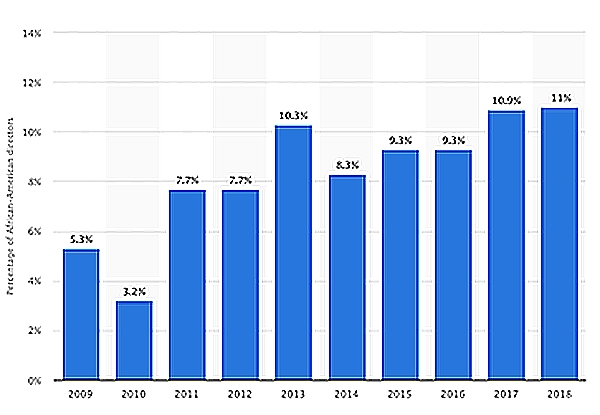
https://www.statista.com/statistics/547948/percentage-of-new-african-american-directors-on-fortune-500-boards/
Here Are My Recommendations To Correct This Deficiency
Golf’s organization and associations should implement what I am calling the Louis- Sifford Guidelines. Named after Joe Louis and Charlie Sifford, two great African Americans both of whom are significantly and inextricably tied to golf.
Golf’s leading organizations and associations should immediately adopt these guidelines to consciously make the effort and commitment to interview and select African American candidates for Board and Senior Management positions within their respective organizations.
Specifically, organizations should voluntarily agree to the following:
- Officially adopt the Louis-Sifford Guidelines as the guiding principle in filling Board and Executive staff positions
- Formally pass a resolution adopting the Louis-Sifford Guidelines
- Issue a news release announcing their adoption and support of the Louis-Sifford Guidelines
- Publicize the adoption of the guidelines on their website, social media and in other corporate media
- Agree to identify and interview African American candidates for any and all Board and Executive Staff positions
- Announce selections as positions are filled by African Americans
- Increase the number of positions on the Board and Senior Staff
- Encourage other golf organizations and associations to join the effort
Why Joe Louis?
Legendary heavyweight boxing champion Joe Louis became one of the most influential amateur golfers in American history. Louis’s sincere love of golf, coupled with his competitiveness to improve his game, led to him supporting a crusade for diversity in golf.
In 1952, Louis was invited to play in the San Diego Open, but the PGA’s “Caucasian only” membership clause in its bylaws prevented such an entry. Louis confronted tournament officials and after an emergency meeting, Louis was allowed to compete as an exempt amateur. Louis wasn’t the only African American golfer attempting to enter that week. His friend, professional Bill Spiller had qualified but was not allowed to play.
Louis became the first person of color to compete in a PGA-sanctioned event. The New York Times reported on Jan. 16, 1952, that Louis said that he would continue his fight “to eliminate racial prejudice from golf, the last sport in which it now exists.”
Why Charlie Sifford?
Charlie Sifford broke barriers all his life. He was the first African American to play the PGA and the first to be inducted into the World Golf Hall of Fame.
It was Sifford who opened professional golf, a game with a “Caucasian only” rule, to blacks more than four decades ago.with his tireless efforts to challenge the rule.
http://www.usga.org/articles/2012/02/a-hard-road-to-golf-glory-21474845949.html
From 1934 to 1961, the Caucasian-only clause was a part of the PGA of America’s by-laws that prevented non-whites from membership, and from competing on the PGA Tour. The clause was removed at the 1961 PGA Annual Meeting. Read about the account here, http://archive.lib.msu.edu/tic/golfd/article/1962jan58F.pdf
So, from my perspective, even though the “Caucasian only policy” was removed in 1961 from the PGA of America to allow African Americans membership it has, in fact, remained in force as it relates to African Americans occupying the highest levels of golf industry management and policymaking.
So sadly since 1961, in 58-years not much has happened.
Mind you the NFL saw a similar problem with the lack of African American head coaches and instituted a policy to make changes. They instituted The Rooney Rule.
Adopted in 2003, the Rooney Rule is an NFL policy requiring every team with a head coaching vacancy to interview at least one or more diverse candidates. In 2009, the Rooney Rule was expanded to include general manager jobs and equivalent front-office positions. The Rooney Rule is named after the late former Pittsburgh Steelers owner and chairman of the league’s diversity committee, Dan Rooney.
These rules were even strengthened in December of 2018, at a special league meeting in Dallas. The NFL’s Workplace Diversity Committee presented modifications to strengthen and enhance the effectiveness of the NFL’s Rooney Rule. These policy enhancements are part of the League’s ongoing commitment to diversity and inclusion. This may not be perfect but at least we can see the efforts and measure the outcomes. http://www.nfl.com/news/story/0ap3000000999110/article/nfl-expands-rooney-rule-requirements-to-strengthen-diversity
GOLF CAN DO A GREAT JOB
I know Golf can do a great job as evidenced by Golf’s most notable executive hire, Joe Louis Barrow Jr, (Yes, the son of the world champion boxer) who headed the First Tee of America as CEO for 18 years. Tim Finchem, former PGA TOUR Commissioner and Chair of The First Tee and World Golf Foundation boards, has stated, “Joe has served The First Tee organization, the golf community and the young people of this nation well through his visionary and impassioned leadership. There is little doubt that his guidance has been instrumental in bringing the organization to where it is today. We are incredibly proud of and thankful for his service to the game of golf and young people through The First Tee.”
When Suzy Whaley, the first female president of the PGA of America, announced that Renee Powell, who is revered in the golf industry, would become the first At Large member to join the PGA of America Board of Directors, we all cheered. Coincidentally, Renee also serves on the Pro Football Hall of Fame Board of Trustees.
OTHER NOTABLE QUOTES
Jay Karan, Chief Executive Officer of the National Golf Course Owners Association said it best, “It’s all symbiotic. The more diversity we have among owners and operators, the more diversity we will have among people who work at golf courses and even the people who play the game of golf. People of diverse backgrounds need to see themselves when they look at the industry from top-down. I am certain we struggle in finding the best path to that vision. “
Thank you, Jay, for being honest for it is that same honesty that will help make the needed changes.
Allison Keller, Chief Administrative Officer of the PGA Tour, overseeing Talent, Culture and Communications stated, “Certainly we are not as diverse as we would like to be but we are committed to doing more in Diversity and Inclusion. We need to be more intentional in our efforts to recruit qualified and diverse candidates”
Right on Allison. AND, let all of Golf be intentional in these efforts.
An article written for The DallasNews.com by Karen Robinson-Jacobs entitled “With nearly all-white membership, PGA of America looks to diversify” delves into the racial make-up of the PGA.
CONCLUSION
Well, there are more Joe Louis Barrow Jr’ s and Renee Powell’s out there waiting to serve the Golf industry at the highest levels. Golf can and must move from an embarrassingly low percentage of African Americans on Boards of Directors and in Senior Management to a more representative number. We at AAGD stand ready to assist organizations to develop strategies and plans to address this matter.
If Golf is serious then Golf needs to find, select, elect and promote African Americans for these positions and find them now- for the good of the game.
James Beatty, Executive Editor, African American Golfer’s Digest James R. Beatty is Founder of NCS International, an Omaha, Nebraska-based company that providers of an array of economic development services. He serves as Executive Editor at the African American Golfer’s Digest and on the We Are Golf Diversity Task Force where he is Chair of the Recreational and Competitive Play Subcommittee. Send your comments to Jim at jbeatty138@aol.com
YOU MAY ALSO LIKE: VIDEO – “WE ARE NOT GOLF YET” SPECIAL INTERVIEW


